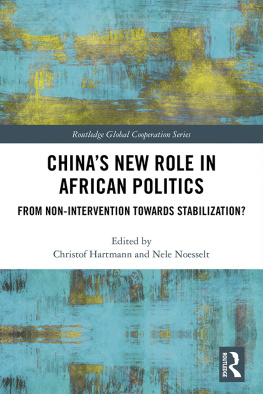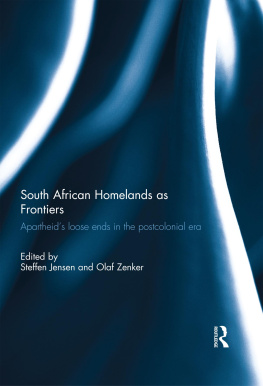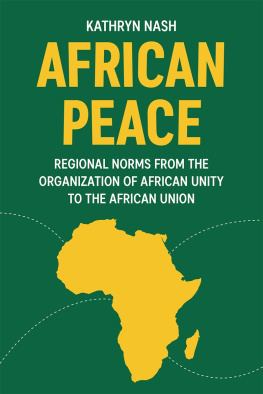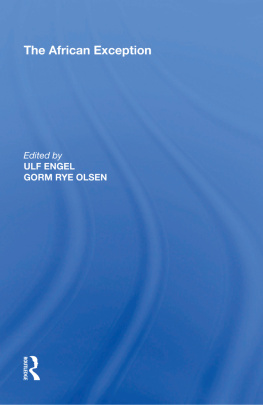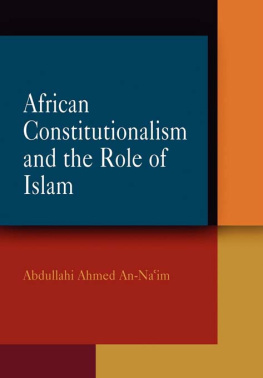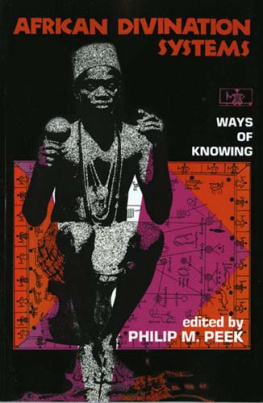First published 1999 by Ashgate Publishing
Reissued 2018 by Routledge
2 Park Square, Milton Park, Abingdon, Oxon OX14 4RN
52 Vanderbilt Avenue, New York, NY 10017
Routledge is an imprint of the Taylor & Francis Group, an informa business
Copyright African Studies Centre, Leiden, 1999
All rights reserved. No part of this book may be reprinted or reproduced or utilised in any form or by any electronic, mechanical, or other means, now known or hereafter invented, including photocopying and recording, or in any information storage or retrieval system, without permission in writing from the publishers.
Notice:
Product or corporate names may be trademarks or registered trademarks, and are used only for identification and explanation without intent to infringe.
Publishers Note
The publisher has gone to great lengths to ensure the quality of this reprint but points out that some imperfections in the original copies may be apparent.
Disclaimer
The publisher has made every effort to trace copyright holders and welcomes correspondence from those they have been unable to contact.
A Library of Congress record exists under LC control number:
Cover illustration: The central panel of the stained glass windows at Africa Hall, Addis Ababa. Courtesy of the Royal Tropical Institute, Amsterdam.
Illustrations:
: Madagascar Renouveau.
Research for this book was in part funded by two grants from the Netherlands Foundation for the Advancement of Tropical Research (WOTRO).
ISBN 13: 978-0-367-13467-9 (hbk)
ISBN 13: 978-0-367-13473-0 (pbk)
ISBN 13: 978-0-429-02667-6 (ebk)
A friend once thanked me in a paper he had written on the first All-African Peoples Conference for the encouragement I had given him by way of, what he saw as, my Nkrumahist tendencies. It earned him an irritated response because, surely, I did not give others reason to belief that I was so naive about the feasibility of Osagyefos Pan-Africanist ambitions.
Yet in a way my friend was right. For my interest in the OAU stems from a profound fascination with the paradox of a continent, where the seeds of discord are abundant, social and cultural cleavages are sharp and economic interests pitted against each other, but where many people nevertheless hold convictions about the need and possibility for African unity, frequently argue its case and to varying degrees attempt to work towards its realization never mind the tremendous odds against it and the narrow margins of autonomy that Africans face in their struggles for a better future. In the context of these innumerable obstacles and difficulties this is a tale with an epic touch which no one can gainsay.
There are also few subjects so much governed by contradictions, surrounded by controversy and marked by ambiguities. Thus, when I had completed an interview at the Netherlands embassy in Addis Ababa I was brought back by the embassys chauffeur to my temporary residence and we passed the OAU headquarters in Kirkos, one of the more plebeian districts of the Ethiopian capital. In a bid to kill the time I asked the chauffeur what he thought of the OAU. I dont, he replied aptly, accompanying his answer with a broad grin on his face.
Africa and the OAU. This constitutes, indeed, a perplexing subject, as life on the continent is marked by huge social distances and Africans hold widely divergent views of the Organization. The discrepancies in African opinion are not only due to differences in positions and interests but for reasons explained in this book are also caused by the fact that the OAU represents the very epitome of Africa itself, and thus elicits and assembles all manner of wisdom, hope and frustration. It is therefore far from easy to ascertain the OAUs place in Africa in fact as well as in thought.
This, however, is what I have intended to do. The purpose of this book is to show how the Organization of African Unity functions in the complex configurations of African politics. Special emphasis is laid on the ways in which this functioning is grasped by its officials and member states, as well as by Africans to whom the fruits of governmental privilege have been denied. As assessments of the OAU vary, it is imperative to unearth what specifically constitutes its rationale. This can only be culled from its ideological underpinnings, for international institutions do not have goals of themselves but only those assigned to them by the forces which control their existence. While constitutive treaties provide some clues as to their raison dtre, in the case in question these only amount to vague intimations of the intricate complex of forces, energies and aspirations driving the OAU.
Thus, in trying to conceive of the Organization of African Unity this book aims to reconstruct its ideological dimensions and provide fresh insights in African thought on issues of international politics. It is in this respect habitually forgotten that international organizations are much more than mere compilations of prosaic or tedious procedures and organs. They also serve as focal junctures that people, in and outside the corridors of power, employ for the expression of their ideas, the articulation of their visions and the experiencing of their dreams or nightmares about life in this world. It is, above all, these views and notions obscure, jaundiced or concrete and articulate that I have attempted to bring to the fore, as the role of the OAU in the political psychology of post-colonial Africa has, until now, received little to no attention.
In this I have especially tried to fathom the OAU from the perspective of painfulness which Africans sense, when confronted with the chasm between the aspirations embodied by the OAU and its impotence in the harsh world of power politics and, more generally, when they must face up to the dualism engendered by their own cosmology and the alien forms of international intercourse which to a greater or lesser extent were thrust upon them by the outside world. In order to make sense of these experiences Africans have coined various disturbing metaphors, around which this book has been structured. These key images have not been included in order to hold up to other peoples ridicule what the OAU stands for, but to elucidate some of the apprehensions and anxieties Africans feel with regard to the OAU and the numerous issues, continental and global, with which it is concerned.
In fact, far from wishing to mock the OAUs ambitions and difficulties I must confess here to my own Pan-Africanist inclinations. As long as the texture of African societies continues to be seriously impaired by the uprooting forces of external penetration the logic of togetherness is, I feel, unassailable. So the OAU deserves thoughtful attention, while the dream of African unity remains, for better and for worse, a part of my own political landscape.
This book is therefore dedicated to the staff of the OAUs General Secretariat, who are the true heroes of this story. Here I wish to express my gratitude for the time they spent to receive me and answer my numerous queries, as well as for their willingness to engage in regular correspondence and forward to me valuable, additional documentation. As it would be a mark of conceit to assume that I could truly probe the psyches of those involved in Pan-African intercourse, it has to be stressed that this evaluation of the OAU, and its underlying mental complexes, is entirely mine and cannot be held against OAU staff.


